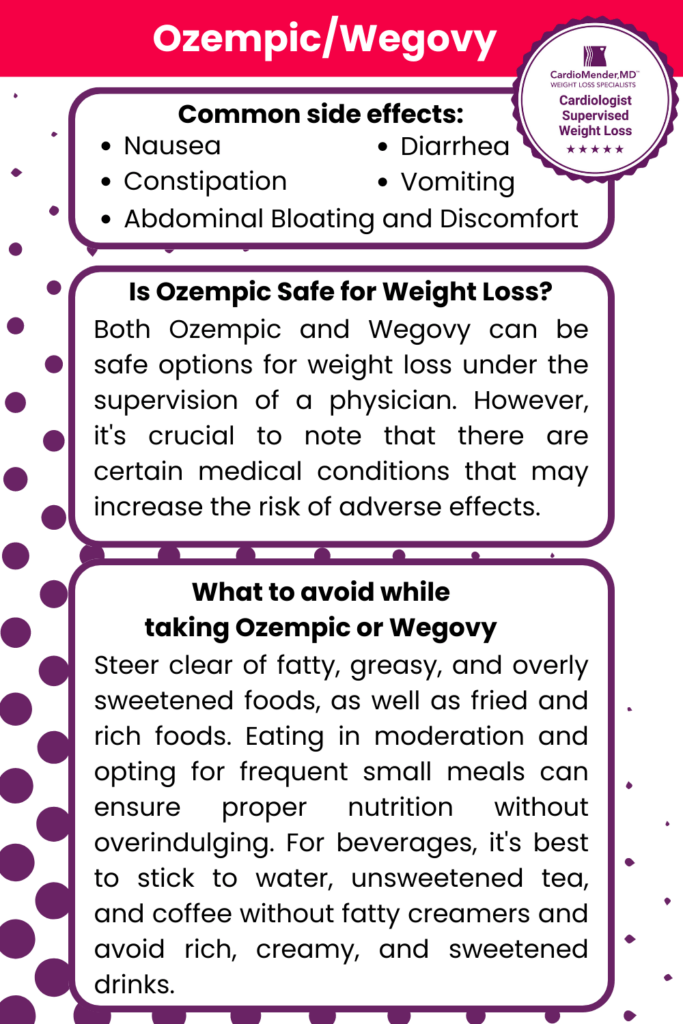While originally developed to help manage blood sugar in adults with type 2 diabetes, research suggests that Ozempic, a once-weekly injectable medication, may also provide practical weight loss benefits. With a growing trend of off-label use for weight loss and a shortage of the FDA-approved weight loss drug Wegovy, it’s important to understand the effectiveness and safety of using Ozempic for weight loss.
CardioMender, MD Weight Loss Specialist, a leading medical weight loss practice in South Florida, explores the research and facts behind Ozempic’s weight loss effects and provides insights from physicians to help you make an informed decision about your weight loss journey.
What is Ozempic?
Ozempic is a prescription medication approved by the FDA for treating type 2 diabetes in adults. Its active compound, semaglutide, is a GLP-1 receptor agonist that enhances the effects of the naturally occurring hormone GLP-1. Ozempic is a once-weekly injectable medication that improves blood sugar levels, lowers hemoglobin A1C, and reduces the risk of cardiovascular events in adults with type 2 diabetes and known heart disease.
Is Ozempic Insulin?
While Ozempic helps regulate blood sugar levels like insulin, it is not. Ozempic works by helping the pancreas produce more insulin when needed. Unlike insulin, Ozempic rarely causes low blood sugar, making it a popular option for those with type 2 diabetes.
Ozempic for Weight Loss: How Does It Work?
Although it is not explicitly marketed as a weight loss drug, studies suggest that Ozempic can lead to weight loss by reducing hunger, appetite, and cravings. The active compound in Ozempic is semaglutide, a GLP-1 receptor agonist that enhances the effects of GLP-1, a naturally occurring hormone. This hormone impacts weight by reducing hunger, appetite, and cravings, slowing the stomach emptying rate, and prolonging fullness and satiety after meals. As a result, the net effect is decreased hunger, prolonged fullness, and weight loss.
Although Ozempic is FDA-approved only for treating diabetes, the FDA recently approved Wegovy, a weight loss drug that uses a higher dose of semaglutide than Ozempic. In a clinical trial, 1,961 adults with excess weight or obesity who did not have diabetes were given 2.4 milligrams of semaglutide or a placebo once a week for 68 weeks, along with lifestyle intervention. On average, those who took semaglutide lost 14.9% of their body weight compared with 2.4% for those who took the placebo.
It’s important to note that while taking semaglutide may contribute to weight loss while on the drug, most people regain weight if they discontinue its use and do not adopt sustainable changes in their diet and lifestyle. Ozempic and Wegovy are the same medication, just available in different doses.
How to Take Ozempic
Both Ozempic and Wegovy (semaglutide) are administered weekly under the skin. Initially, patients are given a low dose, which is then gradually increased every four weeks until the desired effects are achieved or if the dose is limited by side effects (gastrointestinal issues are most common). The maximum dose of Ozempic recommended for controlling and managing type-2 diabetes is 2mg weekly. In contrast, the optimal dose for weight loss with Wegovy is 2.4mg per week.
It is important to note that the higher dose of semaglutide in Wegovy has been specifically approved by the FDA for weight loss. In contrast, Ozempic is not labeled as a weight loss medication.
What to avoid while taking Ozempic or Wegovy
To get the most out of Ozempic or Wegovy, it’s important to make some dietary and medication adjustments. Steer clear of fatty, greasy, and overly sweetened foods, as well as fried and rich foods. Eating in moderation and frequent small meals can ensure proper nutrition without overindulging. For beverages, it’s best to stick to water, unsweetened tea, and coffee without fatty creamers and avoid rich, creamy, and sweetened drinks. Eating this way will help you get the most benefits from the medication without any negative interactions or side effects.
Since both medications fall under the GLP-1 Agonists class, it’s important not to take other drugs in this category while taking Ozempic or Wegovy.
Is Ozempic Safe for Weight Loss?

Both Ozempic and Wegovy can be safe options for weight loss under the supervision of a physician. However, it’s crucial to note that certain medical conditions may increase the risk of adverse effects.
- Individuals with a personal or family history of medullary thyroid cancer or MEN-2 should not take these medications.
- Patients with Type-2 Diabetes, who are on medications that lower their blood sugar levels, should be carefully monitored for hypoglycemia when taking Ozempic and Wegovy.
- Those with impaired kidney function should also use these medications cautiously, as severe dehydration from vomiting and nausea can worsen their condition.
- Patients with a history of pancreatitis should be aware of the rare association of this condition with Ozempic and Wegovy.
- Patients with active biliary or gallbladder disease should use these medications with caution.
- Since depression and mood changes can occur, people with moderate or severe depression should only use these medications under the supervision of their healthcare practitioner.
Common Side Effects of Ozempic and Wegovy
Ozempic and Wegovy are effective weight-loss medications but have potential side effects like any medication. The most common side effects associated with the use of Ozempic and Wegovy are primarily gastrointestinal, including:
- Nausea
- Abdominal bloating and discomfort
- Constipation
- Diarrhea
- Vomiting
These side effects are generally self-limited and often resolve within the first few days when the drugs are started and again when the dose increases. Since Ozempic and Wegovy affect hunger and cravings, some people may experience mood changes, depression, and fatigue; this is due to the medication’s impact on their body chemistry. People who experience profound nausea and vomiting on Ozempic and Wegovy require careful monitoring of their kidney function, which can become impaired with inadequate fluid intake. Pancreatitis is a serious but rare side effect associated with both medications. Patients with type-2 diabetes, who are on certain medications, may experience low blood sugar (hypoglycemia). Additionally, Ozempic and Wegovy have been shown in animal studies to increase the likelihood of a rare form of thyroid cancer (MTC) and thus should be avoided in certain high-risk patients.
Should I Use Ozempic for Weight Loss?
Before using Ozempic or Wegovy for weight loss, patients should consider their medical history and any risk factors for potential side effects such as gastrointestinal symptoms, mood changes, and impaired kidney function. You should always discuss your medication regimen with your healthcare practitioner before starting a weight loss program, especially if you are taking medications for Type-2 diabetes. Finally, patients should consider their overall lifestyle and habits, including their diet and exercise routine, to determine if Ozempic or Wegovy would be a helpful addition to their weight loss plan.
Get Started with CardioMender, MD Today!
Ozempic and Wegovy are effective medications for weight loss, but they should always be used under the careful supervision of a medical practitioner due to the potential side effects and medical contraindications. Patients should also make healthy lifestyle changes and follow a balanced diet to support their weight loss journey.
If you are considering using Ozempic for weight loss or have any questions about weight loss services in South Florida, please contact Cardiomender, MD, today for more information and to request a no-obligation consultation. We are here to support and guide you toward a healthier, happier lifestyle.
Ozempic for Weight Loss: FAQs
We’ve compiled answers to common questions about Ozempic for weight loss to provide more information and help you make an informed decision about your health.
Do Ozempic and Wegovy work for weight loss?
Yes, both Ozempic and Wegovy are associated with weight loss, with the most significant weight loss seen at the highest dose of 2.4 mg per week, which is only available with Wegovy. However, only Wegovy is FDA-approved for weight loss, while Ozempic’s maximum dose is lower and is not approved for medically supervised weight loss.
Will I regain my weight once I stop Ozempic or Wegovy?
To prevent regaining weight after taking Ozempic or Wegovy, a sustainable lifestyle and nutritional changes addressing factors that caused the weight gain must be integrated. It’s recommended that patients undergo an analysis of nutritional, behavioral, physiological, and genetic factors that led to weight gain, followed by education and implementation of changes addressing the root causes. This process can be challenging, which is why analysis and proper support are critical to helping with implementation.
How are Ozempic and Wegovy taken?
Ozempic and Wegovy are weekly injections administered under the skin. Starting at a low dose of 0.25 mg per week, the dosage is gradually increased every month until the desired effect is achieved or until side effects limit further dosage increases.
What does Ozempic or Wegovy cost?
Ozempic is only covered by insurance for the treatment of Type 2 diabetes. The list price is $1,100, but with a GoodRx coupon, the price drops to $907 in Broward County (as of Spring 2023; this cost may change). Wegovy is FDA-approved for medically supervised weight loss, but most insurance companies do not cover it. The lowest discounted price in Broward County is $1305, according to GoodRx.
What is the best dose of Ozempic for weight loss?
The weight loss benefits of Ozempic and Wegovy increase as the dose gradually increases. Maximum weight loss is achieved at 2.4 mg per week, which is only available with Wegovy and not with Ozempic.
Do I still need to watch my diet and exercise when taking Ozempic or Wegovy?
Yes, nutrition and lifestyle changes like increased activity and some form of exercise are very important. Avoiding sugary, rich, greasy, and fatty and sweetened food and beverages is also important. To prevent regaining weight, it is critical to developing sustainable lifestyle changes.
Does taking Ozempic or Wegovy cause any side effects?
- Some common side effects of both Ozempic and Wegovy are due to slowed gastrointestinal tract motility, which can cause nausea
- Indigestion
- Constipation
- Diarrhea
- occasional vomiting
These symptoms typically subside within a few days to a few weeks. Other possible side effects include fatigue, mood changes, and depression, although these are less common. Additionally, patients with Type-2 diabetes who take certain blood sugar-lowering medications may experience low blood sugar. Pancreatitis or inflammation of the pancreas can occur, as well as kidney problems in certain patients who get extremely dehydrated. Gallbladder problems can occur as well. Personality and mood changes, as well as depression, are rare side effects that may occur.
For more information on semaglutide, view our article “Cutting-Edge Weight Loss with Semaglutide” here.




